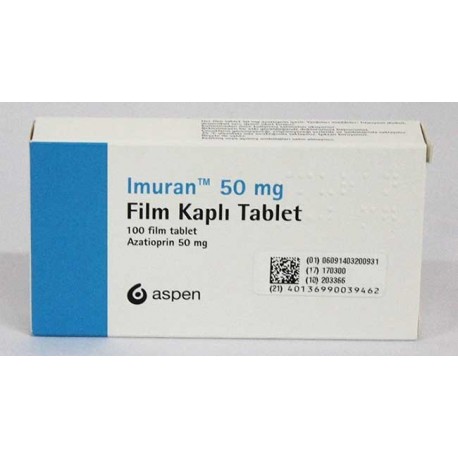 View larger
View larger Volume discounts
| Quantity | Discount | You Save |
|---|---|---|
| 2 | 5% | Up to $3.90 |
| 3 | 10% | Up to $11.70 |
| 4 | 15% | Up to $23.40 |
| 5 | 20% | Up to $39.00 |
More info
IMURAN Film Coated Tablet is taken orally.
Active ingredient
It is Azathioprine. Each tablet contains azathioprine.
What is IMURAN and what is it used for?
IMURAN is sold as 100 tablets of 50 mg in blister.
IMURAN is a member of the group called immunosuppressive drugs, immunosuppressive drugs weaken the immune system, but this is a desirable effect in organ transplant patients or in some diseases (autoimmune diseases) where the immune system damages its own body cells.
IMURAN is used in the following situations:
• In organ transplant patients, in order to increase the acceptability of the transplanted organ
To treat some diseases (autoimmune diseases) in which the immune system damages its own body cells
Autoimmune diseases in which IMURAN is used are as follows:
Severe rheumatoid arthritis (swelling and pain in the joints due to inflammation)
Dermatomyositis / polymyocyte (inflammatory diseases of unknown cause in skeletal muscle, unlike polymyositis in dermatomyositis, symptoms include skin rash)
Autoimmune chronic active hepatitis (an autoimmune disease that develops with fever, joint pain and skin rash usually seen in young women)
Pemphusus vulgaris (an autoimmune disease of unknown cause characterized by the formation of blisters on the skin and mucous membranes)
Polyarteritis nodosa (vascular disease that develops with inflammation of the small arteries, sometimes accompanied by fever)
Autoimmune hemolytic anemia (a disease in which immune system cells damage blood cells called red blood cells)
Chronic refractory idiopathic thrombocytopenic purpura (an autoimmune disease that develops with a decrease in the number of cells that allow coagulation in the blood called thrombocytes and bleeding on the mucous membranes)
3. How to use IMURAN?
Instructions for proper use and dose / frequency of administration
Use in adults
In organ transplantation: Usually IMURAN can be given up to a dose of 5 mg / kg / day on the first day of treatment. The maintenance dose is between 1-4 mg / kg / day.
Due to the risk of rejection of the transplanted organ, IMURAN treatment should be applied indefinitely, even at very low doses.
Other diseases: The general starting dose is 1-3 mg / kg / day. Depending on the response you give to the treatment, your doctor may increase the dose of your medication from doses below 1 mg / kg / day up to 3 mg / kg / day.
Application route and method
Take IMURAN tablets with some water.
Different age groups:
Use in children
In organ transplantation and in the treatment of other diseases: It is the same as the dose and method of administration applied in adults.
Use in the elderly
Your doctor will adjust the dose of your medication according to your general condition.
Special use cases:
Kidney and liver failure:
Your doctor will adjust the dose of your medication according to the condition of your kidney and liver disease. Unless your doctor recommends otherwise follow these instructions.
Do not forget to take your medicine on time.
Your doctor will tell you how long your treatment will take with IMURAN. Do not interrupt your treatment early because you will not get the desired result.
If you have an impression that the effect of IMURAN is too strong or weak, talk to your doctor or pharmacist. one *
If you use more IMURAN than you should
If you have used more than you should use from IMURAN, talk to a doctor or pharmacist.
If you forgot to use IMURAN
Your doctor will decide when to administer the missed dose.
Do not take a double dose to make up for forgotten doses.
Effects that may occur when treatment with IMURAN is terminated
If you are considering stopping IMURAN treatment, consult your doctor first.
4. What are the possible side effects?
Like all medicines, people who are sensitive to the substances contained in IMURAN may have side effects.
If any of the following occur, stop using IMURAN and IMMEDIATELY inform your doctor or go to the nearest emergency department:
Hypersensitivity reactions:
General tiredness, dizziness, nausea, vomiting or diarrhea.
High fever, chills or chills
Skin rash or skin rash
Pain in muscles and joints
- Change in urine color and amount (kidney problems)
Dizziness, confusion, drowsiness caused by low blood pressure
Easy bruising or unusual bleeding
High fever or other signs of infection
• Severe tiredness
Lumps in the body
Changes such as blistering, peeling on the skin
• General health deterioration
These are all very serious side effects.
If you have one of these, you may need urgent medical attention or hospitalization.
Common (less than 1 in 10 people are affected) *

